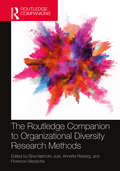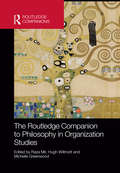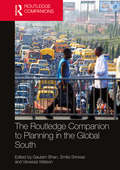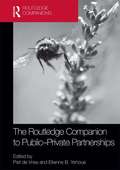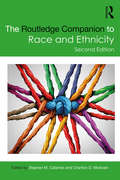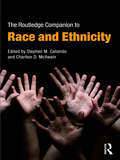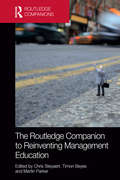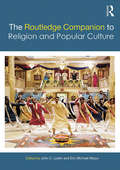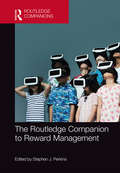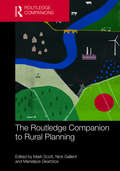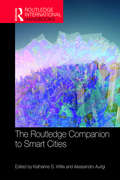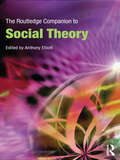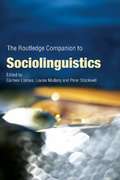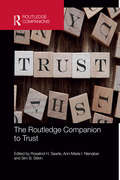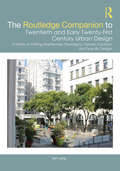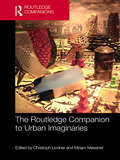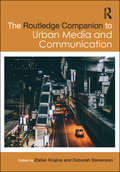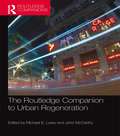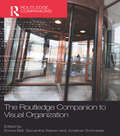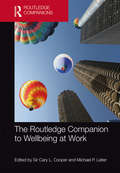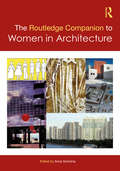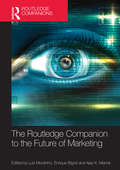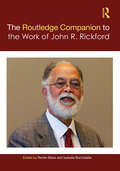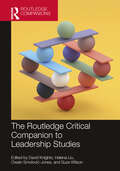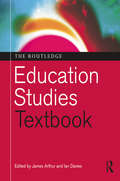- Table View
- List View
The Routledge Companion to Organizational Diversity Research Methods (Routledge Companions in Business, Management and Marketing)
by Sine Nørholm JustOrganizational diversity has become a topic of interest for practitioners and academics alike. This book explores how diversity in organizations is, and can be researched, providing readers with insights into the potential research designs for studies in contemporary organizations. This includes paying attention to methods but also to the role of the researcher and research bodies in the field, their potential as activists as well as to the theoretical question of standpoints in researching organizational diversity. Chapters also consider the diversity of research participants, inclusive research, and intersectionality. All contributors are experts in diversity research, and in their contributions, they reflect upon the appropriate methods for the specific type of diversity research they conduct, noting strengths and weaknesses and illustrating their arguments with practical examples from their work. This handbook will be of great value to academics, students, researchers, practitioners, and professionals with an interest in broadening their understanding of how to research organizational diversity in contemporary organizations or seeking to develop their awareness of diversity when researching management and organization, more generally.
The Routledge Companion to Philosophy in Organization Studies (Routledge Companions in Business, Management and Accounting)
by Hugh Willmott Raza Mir Michelle GreenwoodThe Routledge Companion to Philosophy in Organization Studies provides a wide-ranging overview of the significance of philosophy in organizations. The volume brings together a veritable "who’s-who" of scholars that are acclaimed international experts in their specialist subject within organizational studies and philosophy. The contributions to this collection are grouped into three distinct sections: Foundations - exploring philosophical building blocks with which organizational researchers need to become familiar. Theories - representing some of the dominant traditions in organizational studies, and how they are dealt with philosophically. Topics – examining the issues, themes and topics relevant to understanding how philosophy infuses organization studies. Primarily aimed at students and academics associated with business schools and organizational research, The Routledge Companion to Philosophy in Organization Studies is a valuable reference source for anyone engaged in this field.
The Routledge Companion to Planning in the Global South (Routledge International Handbooks)
by Smita Srinivas Vanessa Watson Gautam BhanThe Routledge Companion to Planning in the Global South offers an edited collection on planning in parts of the world which, more often than not, are unrecognised or unmarked in mainstream planning texts. In doing so, its intention is not to fill a ‘gap’ that leaves this ‘mainstream’ unquestioned but to re-theorise planning from a deep understanding of ‘place’ as well as a commitment to recognise the diverse modes of practice that come within it. The chapters thus take the form not of generalised, ‘universal’ analyses and prescriptions, but instead are critical and located reflections in thinking about how to plan, act and intervene in highly complex city, regional and national contexts. Chapter authors in this Companion are not all planners, or are planners of very different kinds, and this diversity ensures a rich variety of insights, primarily based on cases, to emphasise the complexity of the world in which planning is expected to happen. The book is divided into a framing Introduction followed by five sections: planning and the state; economy and economic actors; new drivers of urban change; landscapes of citizenship; and planning pedagogy. This volume will be of interest to all those wanting to explore the complexities of planning practice and the need for new theories of knowledge from which to draw insight to face the challenges of the 21st century.
The Routledge Companion to Public-Private Partnerships (Routledge Companions in Business, Management and Accounting)
by Etienne B. Yehoue Piet De VriesA public-private partnership (PPP) is a contractual arrangement with appropriate risk sharing between public and private partners for the delivery of public infrastructure or services, which is intended to create value-for-money to the taxpayer. The Routledge Companion to Public-Private Partnerships provides a cutting-edge survey of the field. PPPs remain a highly controversial subject matter globally and this comprehensive and authoritative volume provides a terrific compendium of information for students and scholars charged with understanding, critiquing and advancing this model. With sections devoted to legal aspects, institutional economics perspectives, finance and accountability - the editors draw together an impressive range of contributors from around the world.
The Routledge Companion to Race and Ethnicity (Routledge Companions)
by Stephen M. Caliendo Charlton D. McIlwainThe second edition of The Routledge Companion to Race and Ethnicity offers readers a broad overview of scholarly exploration of the ways that humans have organized themselves (and have been organized) according to racial and ethnic divisions. More than 80 scholars from around the world and representing multiple academic traditions contribute entries to this accessible yet sophisticated volume that addresses contemporary issues in historical context. The first half of the book challenges readers to grapple with some of the most controversial aspects of categorization, prejudice and discrimination through focused chapters ranging from the notion of Whiteness to the supposed biological rationale for racial categorization. The second half is comprised of 70 shorter entries on specialized concepts, persons and groups that are crucial to understanding these issues. Taken as a whole, this volume provides a broad, multi-disciplinary and global overview of issues that continue to provide challenges to notions of equality and justice.
The Routledge Companion to Race and Ethnicity (Routledge Companions)
by Stephen M. CaliendoThe Routledge Companion to Race and Ethnicity is a comprehensive guide to the increasingly relevant, broad and ever changing terrain of studies surrounding race and ethnicity. Comprising a series of essays and a critical dictionary of key names and terms written by respected scholars from a range of academic disciplines, this book provides a thought provoking introduction to the field, and covers: The history and relationship between "race" and ethnicity The impact of colonialism and post colonialism Emerging concepts of "whiteness" Changing political and social implications of race Race and ethnicity as components of identity The interrelatedness and intersectionality of race and ethnicity with gender and sexual orientation Globalization, media, popular culture and their links with race and ethnicity Fully cross referenced throughout, with suggestions for further reading and international examples, this book is indispensible reading for all those studying issues of race and ethnicity across the humanities and social and political sciences.
The Routledge Companion to Reinventing Management Education (Routledge Companions in Business, Management and Accounting)
by Martin Parker Chris Steyaert Timon BeyesThe position and role of the business school and its educational programmes have become increasingly prominent, yet also questioned and contested. What management education entails, and how it is enacted, has become a matter of profound concern in the field of higher education and, more generally, for the development of the organized world. Drawing upon the humanities and social sciences, The Routledge Companion to Reinventing Management Education imagines a different and better education offered to students of management, entrepreneurship and organization studies. It is an intervention into the debates on what is taught and how learning takes place, demonstrating both the potential and the limits of what the humanities and social sciences can do for management education. Divided into six sections, the book traces the history and theory of management education, reimagining central educational principles and outlining an emerging practice-based approach. With an international cast of authors, The Routledge Companion to Reinventing Management Education has been written for contemporary and future educators and for students and scholars who seek to make a difference through their practice.
The Routledge Companion to Religion and Popular Culture (Routledge Religion Companions)
by John C. Lyden Eric Michael MazurReligion and popular culture is a fast-growing field that spans a variety of disciplines. This volume offers the first real survey of the field to date and provides a guide for the work of future scholars. It explores: key issues of definition and of methodology religious encounters with popular culture across media, material culture and space, ranging from videogames and social networks to cooking and kitsch, architecture and national monuments representations of religious traditions in the media and popular culture, including important non-Western spheres such as Bollywood This Companion will serve as an enjoyable and informative resource for students and a stimulus to future scholarly work.
The Routledge Companion to Reward Management (Routledge Companions In Business, Management And Accounting Ser.)
by Stephen J. PerkinsThe Routledge Companion to Reward Management provides a prestige reference work and a state-of-the-art compilation, mapping out contemporary developments and debates on rewarding people in employment, and how they relate to business, corporate governance and management. Reward management stands at the interdisciplinary interface between economics, industrial relations and HRM, industrial psychology and organisational sociology, and increasingly corporate governance incorporating debates around equity and fairness in and around the employment relationship and wider capital-labour relations. In recent years, trade union decline and widening differentials between those employed at the top of organisations have generated critical commentary in the popular media which can negatively impact on social cohesion. Theoretically underpinned but practically oriented, this Companion will synthesise these trends and controversies around issues while tracing conceptual and empirical provenance, currency and future prospects. It will be an invaluable resource for student and researchers in reward management, corporate governance, management and HRM seeking convenient access to an area which is highly complex and controversial in application.
The Routledge Companion to Rural Planning
by Nick Gallent Mark Scott Menelaos GkartziosThe Routledge Companion to Rural Planning provides a critical account and state of the art review of rural planning in the early years of the twenty-first century. Looking across different international experiences – from Europe, North America and Australasia to the transition and emerging economies, including BRIC and former communist states – it aims to develop new conceptual propositions and theoretical insights, supported by detailed case studies and reviews of available data. The Companion gives coverage to emerging topics in the field and seeks to position rural planning in the broader context of global challenges: climate change, the loss of biodiversity, food and energy security, and low carbon futures. It also looks at old, established questions in new ways: at social and spatial justice, place shaping, economic development, and environmental and landscape management. Planning in the twenty-first century must grapple not only with the challenges presented by cities and urban concentration, but also grasp the opportunities – and understand the risks – arising from rural change and restructuring. Rural areas are diverse and dynamic. This Companion attempts to capture and analyse at least some of this diversity, fostering a dialogue on likely and possible rural futures between a global community of rural planning researchers. Primarily intended for scholars and graduate students across a range of disciplines, such as planning, rural geography, rural sociology, agricultural studies, development studies, environmental studies and countryside management, this book will prove to be an invaluable and up-to-date resource.
The Routledge Companion to Smart Cities (Routledge International Handbooks)
by Katharine S. Willis Alessandro AurigiThe Routledge Companion to Smart Cities explores the question of what it means for a city to be ‘smart’, raises some of the tensions emerging in smart city developments and considers the implications for future ways of inhabiting and understanding the urban condition. The volume draws together a critical and cross-disciplinary overview of the emerging topic of smart cities and explores it from a range of theoretical and empirical viewpoints. This timely book brings together key thinkers and projects from a wide range of fields and perspectives into one volume to provide a valuable resource that would enable the reader to take their own critical position within the topic. To situate the topic of the smart city for the reader and establish key concepts, the volume sets out the various interpretations and aspects of what constitutes and defines smart cities. It investigates and considers the range of factors that shape the characteristics of smart cities and draws together different disciplinary perspectives. The consideration of what shapes the smart city is explored through discussing three broad ‘parts’ – issues of governance, the nature of urban development and how visions are realised – and includes chapters that draw on empirical studies to frame the discussion with an understanding not just of the nature of the smart city but also how it is studied, understood and reflected upon. The Companion will appeal to academics and advanced undergraduates and postgraduates from across many disciplines including Urban Studies, Geography, Urban Planning, Sociology and Architecture, by providing state of the art reviews of key themes by leading scholars in the field, arranged under clearly themed sections.
The Routledge Companion to Social Theory (Routledge Companions)
by Anthony ElliottThe Routledge Companion to Social Theory provides an authoritative, comprehensive and provocative introduction to the key traditions of thought in social theory today. This ground-breaking reference work brings together major contributors, both established and emergent new voices, to reflect on the ways in which social theory sheds light on the contemporary social world. Represented are: the traditions of classical social thought symbolic interactionism psychoanalysis structuralism, post-structuralism and postmodernism identity theories globalization theories. The Routledge Companion to Social Theory is designed to give a sense of the complexities of both classical and contemporary social theory. Including a helpful glossary of key terms and theorists, this accessible guide is essential reading for students and professionals in social theory, sociology, philosophy, cultural studies, women’s studies and politics.
The Routledge Companion to Sociolinguistics (Routledge Companions)
by Peter Stockwell Carmen Llamas Louise MullanyHave you ever noticed an accent or puzzled over a dialect phrase? Language can be a powerful tool with which one can create a persona; it can be a common ground between people or can be used as a divide between social groups. This Companion is for anyone who is interested in how and why people speak and write with such diversity. The Routledge Companion to Sociolinguistics includes articles by leading scholars in the field on: methods of observation and analysis social correlates socio-psychological factors socio-political factors language change. With a substantial A-Z glossary of key terms and concepts, directions for further study, and detailed cross-referencing with links to the glossary, The Routledge Companion to Sociolinguistics is both an essential broad-based introduction for those new to the field, and a highly useful reference for the more advanced linguist.
The Routledge Companion to Trust (Routledge Companions in Business, Management and Accounting)
by Sim B. Sitkin Rosalind H. Searle Ann-Marie I. NienaberIn recent years, trust has enjoyed increasing interest from a wide range of parties, including organizations, policymakers, and the media. Perennially linked to turbulence and scandals, the damaging and rebuilding of trust is a contemporary concern affecting all areas of society. Comprising six thematic sections, The Routledge Companion to Trust provides a comprehensive survey of trust research. With contributions from international experts, this volume examines the major topics and emerging areas within the field, including essays on the foundations, levels and theories of trust. It also examines trust repair and explores trust in settings such as healthcare, finance, food supply chains, and the internet. The Routledge Companion to Trust is an extensive reference work which will be a vital resource to researchers and practitioners across the fields of management and organizational studies, behavioural economics, psychology, cultural anthropology, political science and sociology.
The Routledge Companion to Twentieth and Early Twenty-First Century Urban Design: A History of Shifting Manifestoes, Paradigms, Generic Solutions, and Specific Designs (Routledge Companions)
by Jon LangThe Routledge Companion to Twentieth and Early Twenty-First Century Urban Design is a fully illustrated descriptive and explanatory history of the development of urban design ideas and paradigms of the past 150 years. The ideas and projects, hypothetical and built, range in scale from the city to the urban block level. The focus is on where the generic ideas originated, the projects that were designed following their precepts, the functions they address and/or afford, and what we can learn from them. The morphology of a city—its built environment—evolves unselfconsciously as private and governmental investors self-consciously erect buildings and infrastructure in a pragmatic, piecemeal manner to meet their own ends. Philosophers, novelists, architects, and social scientists have produced myriad ideas about the nature of the built environment that they consider to be superior to those forms resulting from a laissez-faire attitude to urban development. Rationalist theorists dream of ideal futures based on assumptions about what is good; empiricists draw inspirations from what they perceive to be working well in existing situations. Both groups have presented their advocacies in manifestoes and often in the form of generic solutions or illustrative designs. This book traces the history of these ideas and will become a standard reference for scholars and students interested in the history of urban spaces, including architects, planners, urban historians, urban geographers, and urban morphologists.
The Routledge Companion to Urban Imaginaries (Routledge International Handbooks)
by Christoph Lindner Miriam MeissnerThe Routledge Companion to Urban Imaginaries delves into examples of urban imaginaries across multiple media and geographies: from new visions of smart, eco, and resilient cities to urban dystopias in popular culture; from architectural renderings of starchitecture and luxury living to performative activism for new spatial justice; and from speculative experiments in urban planning, fiction, and photography to augmented urban realities in crowd-mapping and mobile apps. The volume brings various global perspectives together and into close dialogue to offer a broad, interdisciplinary, and critical overview of the current state of research on urban imaginaries. Questioning the politics of urban imagination, the companion gives particular attention to the role that urban imaginaries play in shaping the future of urban societies, communities, and built environments. Throughout the companion, issues of power, resistance, and uneven geographical development remain central. Adopting a transnational perspective, the volume challenges research on urban imaginaries from the perspective of globalization and postcolonial studies, inviting critical reconsiderations of urbanism in its diverse current forms and definitions. In the process, the companion explores issues of Western-centrism in urban research and design, and accommodates current attempts to radically rethink urban form and experience. This is an essential resource for scholars and graduate researchers in the fields of urban planning and architecture; art, media, and cultural studies; film, visual, and literary studies; sociology and political science; geography; and anthropology.
The Routledge Companion to Urban Media and Communication
by Deborah Stevenson Zlatan KrajinaThe Routledge Companion to Urban Media and Communication traces central debates within the burgeoning interdisciplinary research on mediated cities and urban communication. The volume brings together diverse perspectives and global case studies to map key areas of research within media, cultural and urban studies, where a joint focus on communications and cities has made important innovations in how we understand urban space, technology, identity and community. Exploring the rise and growing complexity of urban media and communication as the next key theme for both urban and media studies, the book gathers and reviews fast-developing knowledge on specific emergent phenomena such as: reading the city as symbol and text; understanding urban infrastructures as media (and vice-versa); the rise of global cities; urban and suburban media cultures: newspapers, cinema, radio, television and the mobile phone; changing spaces and practices of urban consumption; the mediation of the neighbourhood, community and diaspora; the centrality of culture to urban regeneration; communicative responses to urban crises such as racism, poverty and pollution; the role of street art in the negotiation of ‘the right to the city’; city competition and urban branding; outdoor advertising; moving image architecture; ‘smart’/cyber urbanism; the emergence of Media City production spaces and clusters. Charting key debates and neglected connections between cities and media, this book challenges what we know about contemporary urban living and introduces innovative frameworks for understanding cities, media and their futures. As such, it will be an essential resource for students and scholars of media and communication studies, urban communication, urban sociology, urban planning and design, architecture, visual cultures, urban geography, art history, politics, cultural studies, anthropology and cultural policy studies, as well as those working with governmental agencies, cultural foundations and institutes, and policy think tanks.
The Routledge Companion to Urban Regeneration
by John McCarthy Michael E. LearyIn the past decade, urban regeneration policy makers and practitioners have faced a number of difficult challenges, such as sustainability, budgetary constraints, demands for community involvement and rapid urbanization in the Global South. Urban regeneration remains a high profile and important field of government-led intervention, and policy and practice continue to adapt to the fresh challenges and opportunities of the 21st century, as well as confronting long standing intractable urban problems and dilemmas. This Companion provides cutting edge critical review and synthesis of recent conceptual, policy and practical developments within the field. With contributions from 70 international experts within the field, it explores the meaning of ‘urban regeneration’ in differing national contexts, asking questions and providing informed discussion and analyses to illuminate how an apparently disparate field of research, policy and practice can be rendered coherent, drawing out common themes and significant differences. The Companion is divided into six sections, exploring: globalization and neo-liberal perspectives on urban regeneration; emerging reconceptualizations of regeneration; public infrastructure and public space; housing and cosmopolitan communities; community centred regeneration; and culture-led regeneration. The concluding chapter considers the future of urban regeneration and proposes a nine-point research agenda. This Companion assembles a diversity of approaches and insights in one comprehensive volume to provide a state of the art review of the field. It is a valuable resource for both advanced undergraduate and postgraduate students in Urban Planning, Built Environment, Urban Studies and Urban Regeneration, as well as academics, practitioners and politicians.
The Routledge Companion to Visual Organization (Routledge Companions in Business, Management and Accounting)
by Emma Bell Jonathan Schroeder Samantha WarrenThe visual constitutes an increasingly significant element of contemporary organization, as post-industrial societies move towards economies founded on creative and knowledge-intensive industries. The visual has thereby entered into almost every aspect of corporate strategy, operations, and communication; reconfiguring basic notions of management practice and introducing new challenges in the study of organizations. This volume provides a comprehensive insight into the ways in which organizations and their members visualize their identities and practices and how they are viewed by those who are external to organizations, including researchers. With contributions from leading academics across the world, The Routledge Companion to Visual Organization is a valuable reference source for students and academics interested in disciplines such as film studies, entrepreneurship, marketing, sociology and most importantly, organizational behaviour.
The Routledge Companion to Wellbeing at Work (Routledge Companions in Business and Management)
by Cary L. Cooper Michael P. LeiterOver recent years, many companies have developed an awareness of the importance of an active, rather than passive, approach to wellbeing at work. Whilst the value of this approach is widely accepted, turning theory into effective practice is still a challenge for many companies. The Routledge Companion to Wellbeing at Work is a comprehensive reference volume addressing every aspect of the topic. Split into five parts, it explores different models of wellbeing; personal qualities contributing to wellbeing; job insecurity and organizational wellbeing; workplace supports for wellbeing; and initiatives to enhance wellbeing. The international team of contributors provide a solid foundation to research and practice, including contemporary topics such as architecture, coaching, and fitness in the workplace. Edited by two of the world’s leading scholars on the subject, this text is a valuable tool for researchers, students, and practitioners in HRM and organizational psychology.
The Routledge Companion to Women in Architecture
by Anna SokolinaThe Routledge Companion to Women in Architecture illuminates the names of pioneering women who over time continue to foster, shape, and build cultural, spiritual, and physical environments in diverse regions around the globe. It uncovers the remarkable evolution of women’s leadership, professional perspectives, craftsmanship, and scholarship in architecture from the preindustrial age to the present.The book is organized chronologically in five parts, outlining the stages of women’s expanding engagement, leadership, and contributions to architecture through the centuries. It contains twenty-nine chapters written by thirty-three recognized scholars committed to probing broader topographies across time and place and presenting portraits of practicing architects, leaders, teachers, writers, critics, and other kinds of professionals in the built environment. The intertwined research sets out debates, questions, and projects around women in architecture, stimulates broader studies and discussions in emerging areas, and becomes a catalyst for academic programs and future publications on the subject.The novelty of this volume is in presenting not only a collection of case studies but in broadening the discipline by advancing an incisive overview of the topic as a whole. It is an invaluable resource for architectural historians, academics, students, and professionals.
The Routledge Companion to the Future of Marketing: Routledge Companion To The Future Of Marketing (Routledge Companions in Marketing, Advertising and Communication)
by Luiz Moutinho Ajay K. Manrai Enrique BignThe Routledge Companion to the Future of Marketing provides the reader with a comprehensive and original set of visionary insights into the future of marketing. This prestigious collection aims to challenge the mindset of academics, moving their thinking processes from current thinking into new perspectives and advances in marketing knowledge.Selected Contents: Part 1: New Paradigms and Philosophical Insights Part 2: Contributions from other Scientific Fields Part 3: Reconnecting with Consumers and Markets Part 4: New Methodological Insights in Scholarly Research in the Field
The Routledge Companion to the Work of John R. Rickford
by Isabelle Buchstaller Renée BlakeThis comprehensive collection is the first full book-length volume to bring together writing focused around and inspired by the work of John Rickford and his role in sociolinguistic research over the last four decades. Featuring contributions from more than 40 leading scholars in the field, the volume integrates both historical and current perspectives on key topics in Rickford’s body of work at the intersection of language and society, highlighting the influence of his work from diverse fields such as sociolinguistics, stylistics, creole studies, and language and education. The volume is organized around four sections, each representing one of the fundamental strands in Rickford’s scholarship over the course of his career, bookended by short vignettes that feature stories from the field to more broadly contextualize his intellectual legacy: • Language contact from a sociolinguistic and sociohistorical point of view • The political ramifications of linguistic heterogeneity • The stylistic implications of language variation and change • The educational implications of linguistic heterogeneity and social injustice Taken together, The Routledge Companion to the Work of John R. Rickford serves as a platform to showcase Rickford’s pioneering contributions to the field and, in turn, to socially reflective linguistic research more generally, making this key reading for students and researchers in sociolinguistics, creole studies, language and style, and language and education.
The Routledge Critical Companion to Leadership Studies (ISSN)
by Suze Wilson David Knights Helena Liu Owain Smolović-JonesThe Routledge Critical Companion to Leadership Studies offers a rich and insightful overview of critical leadership studies for students, teachers, researchers, and practitioners. The volume draws together 35 chapters from 56 authors who represent the vibrant diversity of the critical leadership community. It includes chapters from emerging and preeminent scholars who share an interest in directing leadership theorizing, development and practice toward the aims of liberation, justice, and equity.The Companion is organized into six themes: (1) philosophical perspectives on leadership; (2) processes, practices, and power dynamics in leadership; (3) diversity and leadership; (4) leadership education and development; (5) lessons from the dark side of leadership; and (6) reimagining leadership and leadership studies.The book has been curated to serve as a "go to" resource for undergraduate and postgraduate students, academic staff, and researchers seeking to understand the current state of play on a given topic, as well as inspiration for how they might contribute to its development. Each chapter provides a comprehensive yet succinct review of contemporary literature and offers the reader avenues for future research. Leadership practitioners will also find provocative ideas among these pages to help them interrogate and transform the ways they lead.
The Routledge Education Studies Textbook
by James Arthur and Ian DaviesThe Routledge Education Studies Textbook is an academically wide-ranging and appropriately challenging resource for students beyond the introductory stages of a degree programme in Education Studies. Written in a clear and engaging style, the chapters are divided into three sections that examine fundamental ideas and issues, explore educational contexts, and offer study and research guidance respectively. To support the development of critical thinking, debates between contributors are interspersed within sections and address the following questions: Do private schools legitimise privilege? Should the liberal state support religious schooling? Are developments in post-14 education reducing the divide between the academic and the vocational? Do schools contribute to social and community cohesion? Do traditional and progressive teaching methods exist or are there only effective and ineffective methods? Educational Research: a foundation for teacher professionalism? Each chapter opens with an overview of the rationale behind it and closes with a summary of the main points. At the end of every chapter key questions are posed, encouraging the student to critically reflect on the content, and suggestions for further reading are made. The Routledge Education Studies Textbook is essential reading for students of Education Studies, especially during second and third years of the undergraduate degree. It will be of interest to trainee teachers, including those working towards M Level. A companion volume, The Routledge Education Studies Reader by the same editors, contains key classic and contemporary academic articles and has been designed to be used alongside this Textbook.
